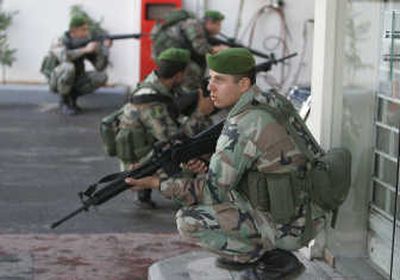Riots break out in Lebanon

BEIRUT, Lebanon – Protesters angry about electricity rationing clashed with Lebanese troops Sunday in Beirut’s worst riots in a year, leaving seven people dead, hospital and security officials said.
Hundreds of Shiite Muslims opposed to the government rioted and burned tires, blocking some major roads in the Lebanese capital and its southern suburbs.
Lebanese soldiers fired into the air to disperse the crowd, but it was unclear how the deaths occurred and whether the soldiers also intentionally fired on civilians.
The army said it was investigating, and Lebanese TV stations reported that unknown snipers may have been involved in an attempt to inflame the disturbances.
Prime Minister Fuad Saniora declared today a national day of mourning, and schools and universities were ordered closed.
It was the Beirut area’s worst rioting since clashes between Sunnis and Shiites at a university cafeteria in January 2007 left four people dead. That incident prompted the army to declare the city’s first curfew in more than a decade.
Electricity cutoffs in recent months were extended for the first time to Beirut, where more than 1 million Lebanese live. More than 15 years after Lebanon’s 1975-90 civil war, the country’s power grid still has not been fully restored, and such protests have been common in the past few weeks, mainly in areas where the opposition has strong support.
Lebanon is also embroiled in its worst political crisis since the end of the civil war. Former President Emile Lahoud left office on Nov. 23 without a successor, and parliament has so far failed to elect the army chief to replace him amid bickering between the parliament majority and the opposition.
On Sunday, Arab foreign ministers rejected Syria’s demand that Hezbollah and its allies have greater representation in Lebanon’s Cabinet, according to delegates at an emergency meeting in Cairo.
Syrian Foreign Minister Walid Moallem had pushed for Hezbollah to have 10 ministers in the next Cabinet – or one-third of the seats – which would effectively give the Hezbollah-led opposition veto power.
Two delegates at the meeting confirmed the information, speaking on condition of anonymity because of the sensitivity of the issue.
Sunday’s violence was confined to mainly Shiite areas, and the army deployed in what appeared to be an attempt to prevent the unrest from spreading to nearby Sunni and Christian areas.
The fighting erupted near the former demarcation line between Christian and Muslim areas during the civil war, and near a district where the first spark of that 15-year sectarian conflict was ignited.